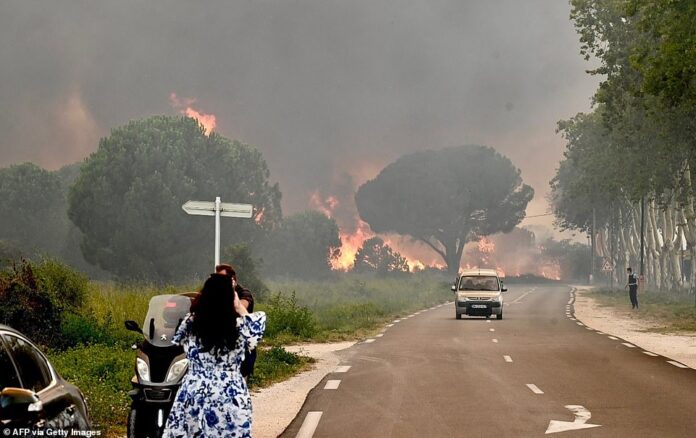[ad_1]
More than 3,000 tourists have been evacuated from a British holiday hotspot in France after ‘catastrophic’ wildfires ravaged homes and holiday campsites.
The blazing wildfires have ripped through 500 hectares of land and seen thousands of terrified tourists flee for their lives from their holiday homes and campsites close to the Spanish border.
The flames have so far gutted scores of homes and destroyed a campsite in the popular holiday region of Pyrenees-Orientales, southern France, as it swept through villages close to the seaside resort of Argeles.
Video shows the flames getting perilously close to campsites, where children can be heard screaming in terror. Families quickly packed their belongings and fled the devastated area in droves as the black smoke filled the sky.
More than 3,000 tourists have now been evacuated from their holiday campsites across the region after the inferno ripped through the tourist hotspot.
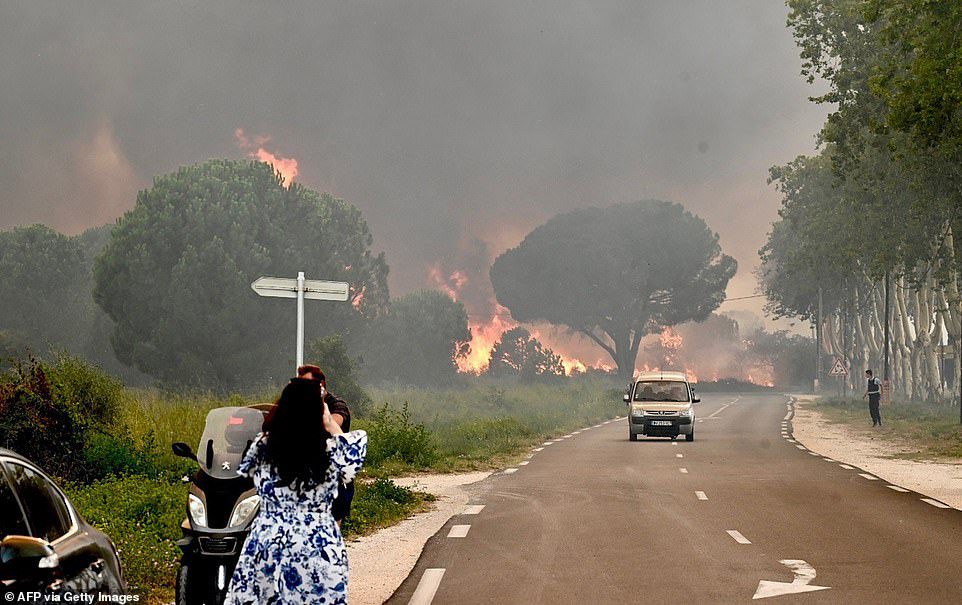
A woman takes a picture of a wildfire that broke out leading to the evacuation of more than 3.000 people from nearby campsites in Saint-Andre near Argeles-sur-Mer south-western France on Monday
La lutte contre les flammes se poursuit dans les Pyrénées-Orientales. D¿ores et déjà 4 campings, soit près de 3000 vacanciers, ont été évacués et de nombreux moyens terrestres et aériens sont mobilisés.
La sécheresse et les vents violents accentuent les risques de propagation¿ https://t.co/RE7qwWdb8R
— Christophe Béchu (@ChristopheBechu) August 14, 2023
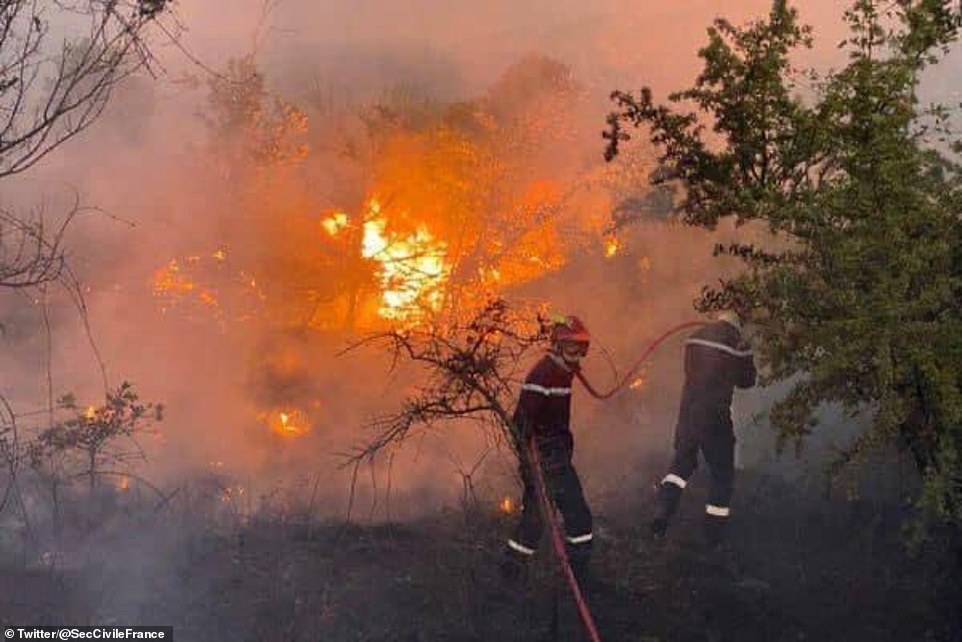
Firefighters use hoses to fight the blaze in southern France on Monday
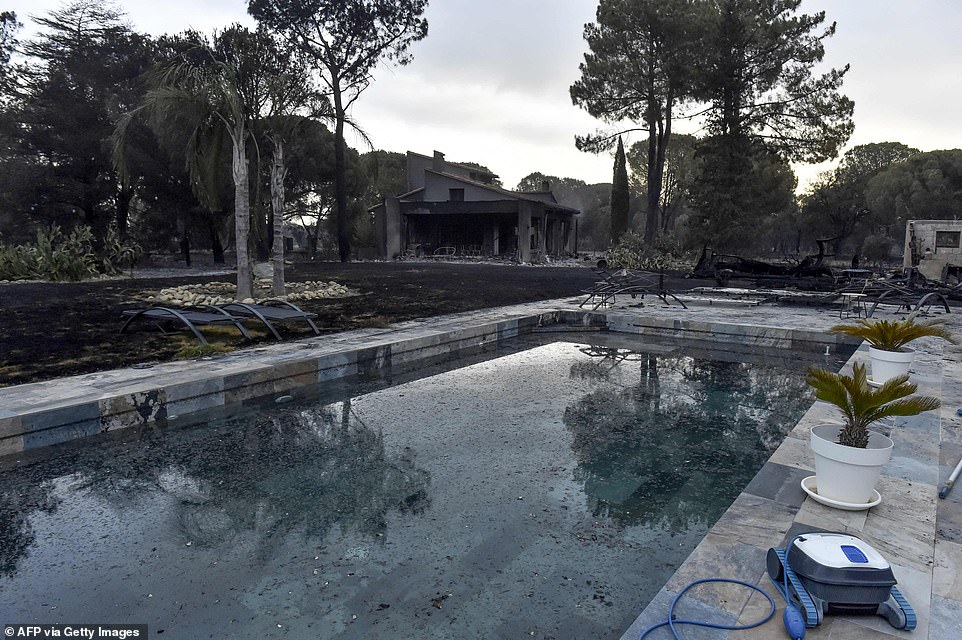
The smouldering remains of a house are seen behind a pool in the aftermath of the fire that ravaged the commune of Saint-Andre in Pyrenees-Orientales on Tuesday
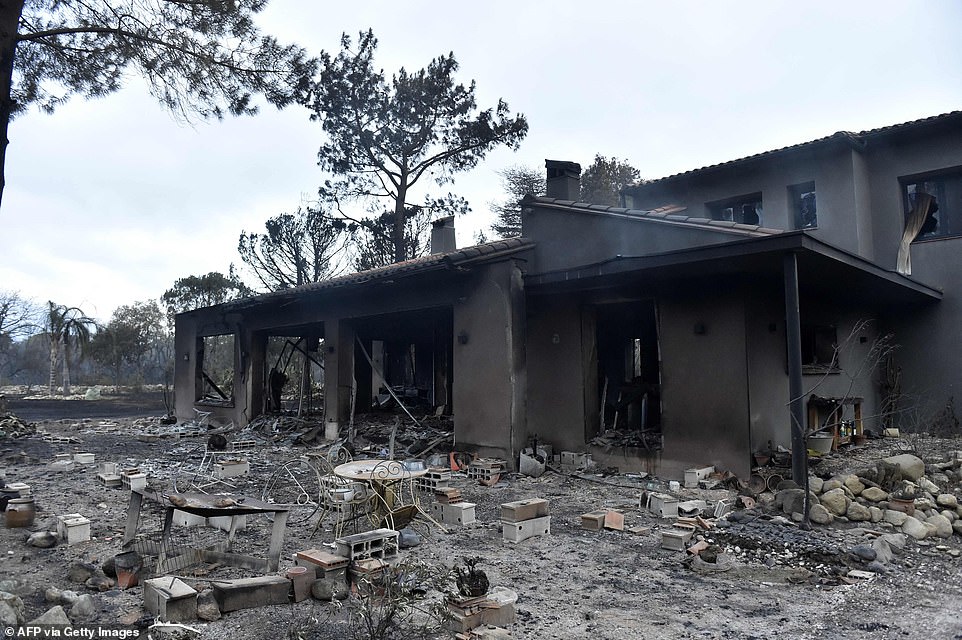
The smouldering remains of a house are seen in the aftermath of the fire that ravaged the commune of Saint-Andre in Pyrenees-Orientales on Tuesday
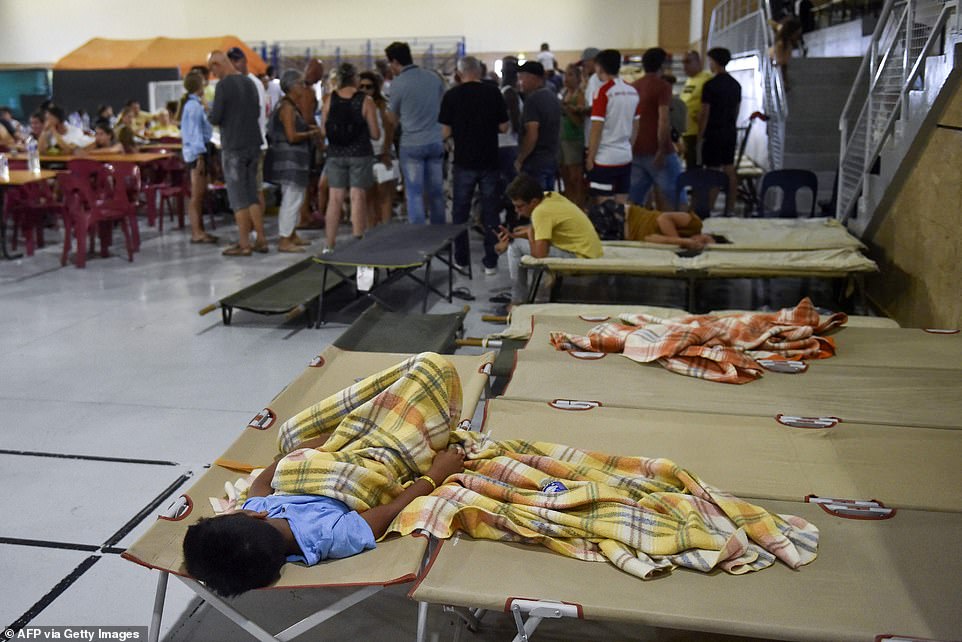
A boy lays down as survivors stand at a temporary accommodation in Argeles-sur-Mer, southern France, on Tuesday after being evacuated from a campsite due to the wildfires
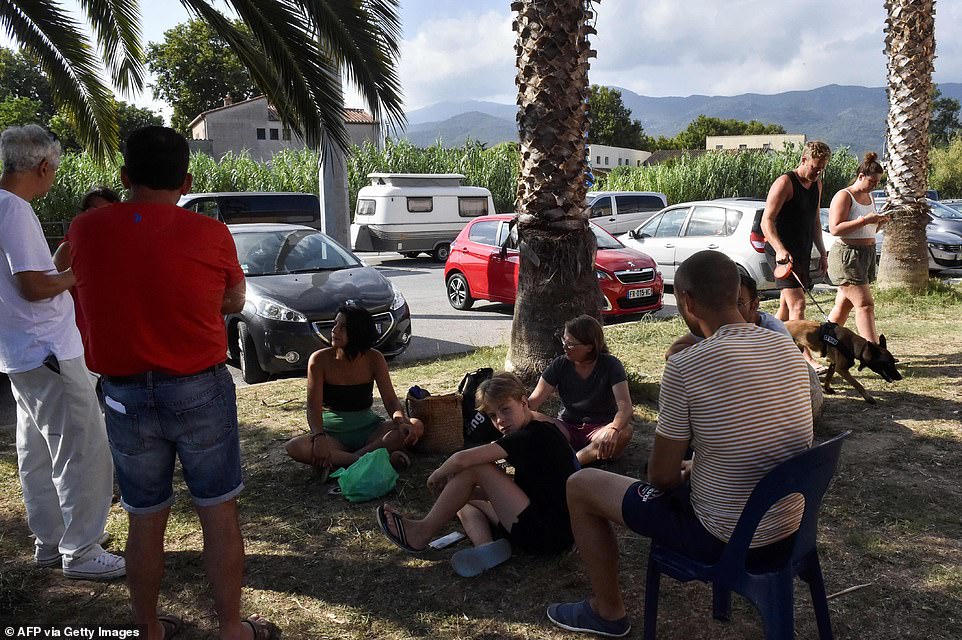
Holidaymakers sit outside their temporary accommodation in Argeles-sur-Mer, southern France, on Tuesday after being evacuated from the wildfires
The wildfire broke out on Monday afternoon and the blaze spread rapidly near the villages of Saint-Andre, Sorede and the seaside resort of Argeles due to the ‘extremely hot weather, drought and strong winds of up to 180km/hr’.
Officials said the wildfire has been contained but remains dangerous as about 450 firefighters backed up by surveillance aircraft today continued to battle the flames south of the city of Perpignan.
‘The fire has been contained,’ senior regional official Rodrigue Furcy told local radio, but the worst affected area was ‘under close surveillance and firefighters were still battling the blaze’.
Seventeen firefighters had sustained light injuries and one was admitted to hospital after a fall ‘but the good news is that there have been no fatalities’, Furcy continued.
Thirty houses had been damaged, along with a warehouse and a campsite.
Several roads were also closed and the train service from Perpignan to the Spanish border was suspended for several hours.
Bordering on Spain, the Pyrenees-Orientales region has been affected worse than any other French region by a devastating drought.
Last week, firefighters battled another wildfire near the southwestern city of Bordeaux that forced around 8,000 people to flee their homes and holiday villas.
Authorities in Spain’s northern Basque Country region said France had stopped freight trucks from crossing the border at Irun due to the fire.
More than 60 square kilometers (23 square miles) have burned in the Gironde region and the neighboring Landes.
The Gironde region was hit last month by major wildfires that forced the evacuation of more than 39,000 people, including residents and tourists.
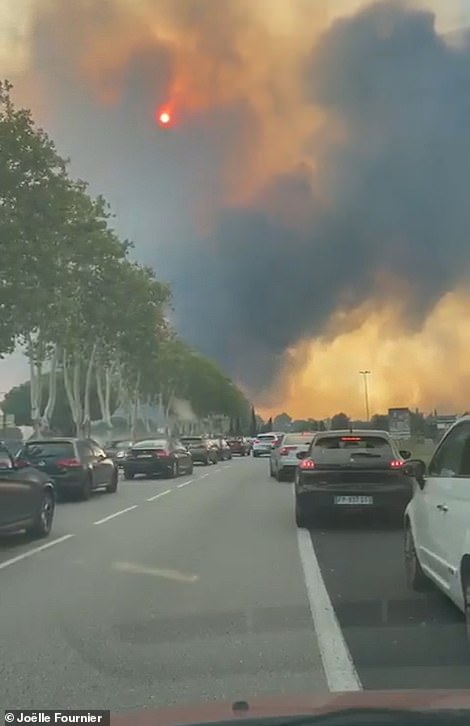
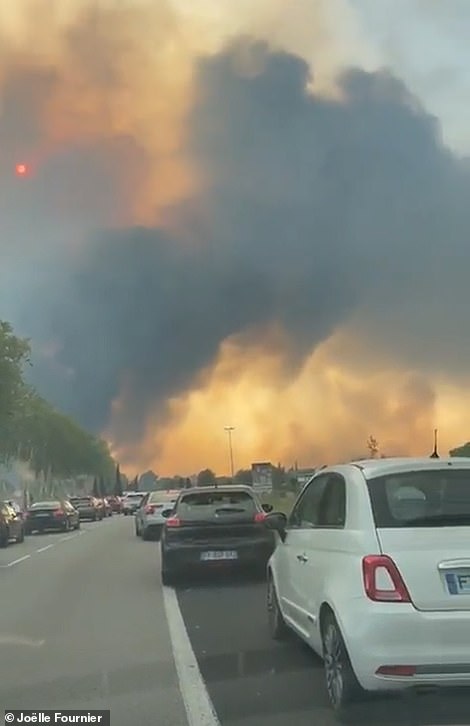
Families quickly packed their belongings and fled the devastated area in droves as the black smoke filled the sky
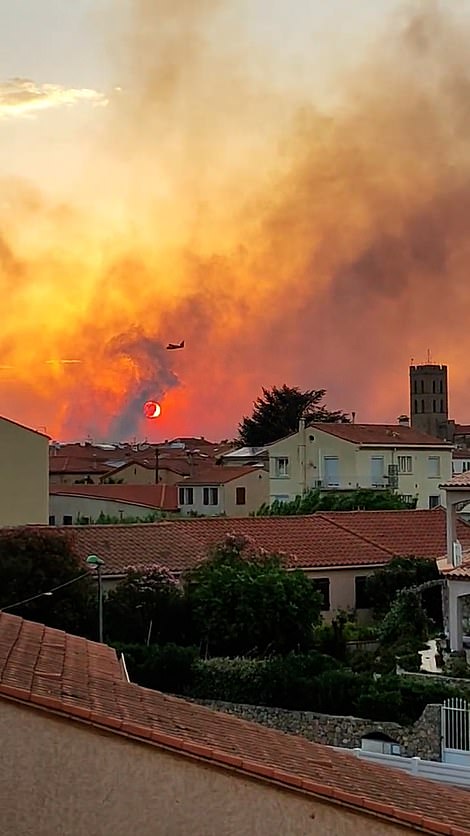
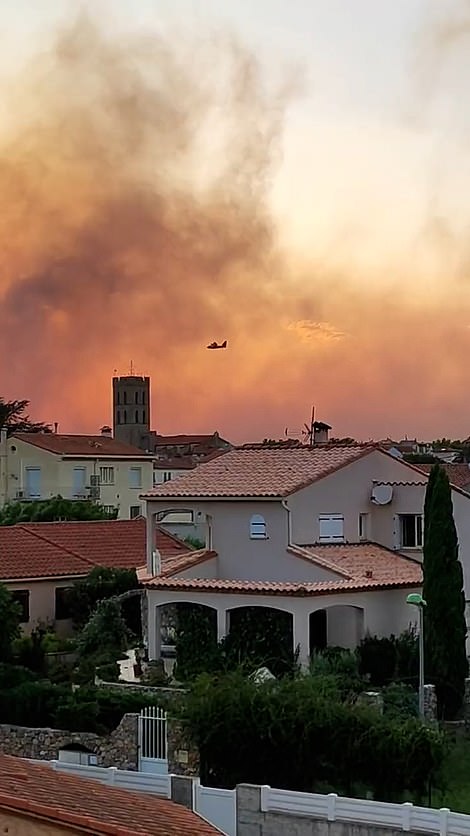
Officials said the wildfire has been contained but remains dangerous as about 450 firefighters backed up by surveillance aircraft (pictured) today continued to battle the flames south of the city of Perpignan
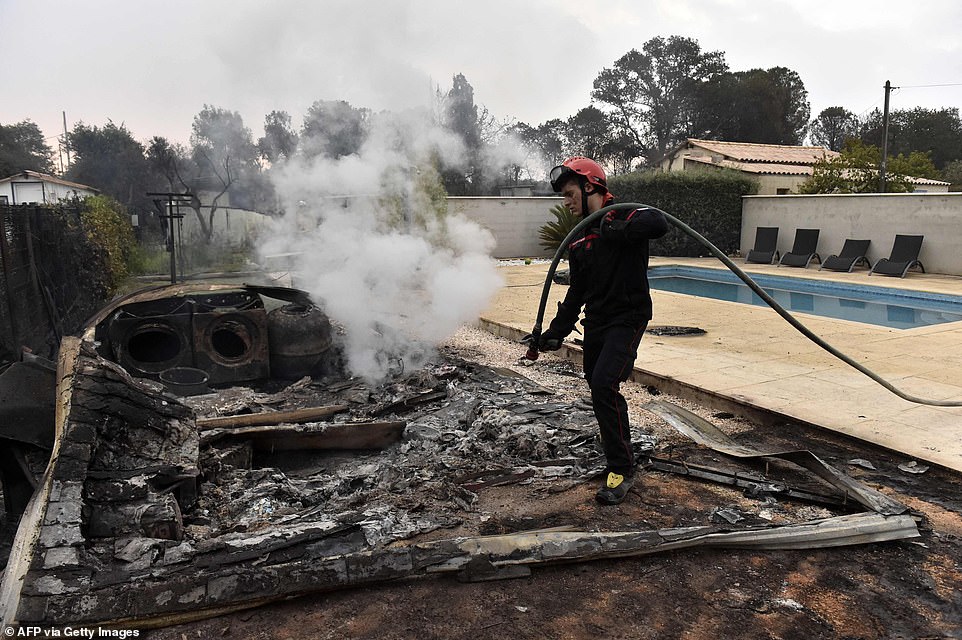
A firefighter puts out fires after the blaze that ravaged the commune of Saint-Andre on Tuesday
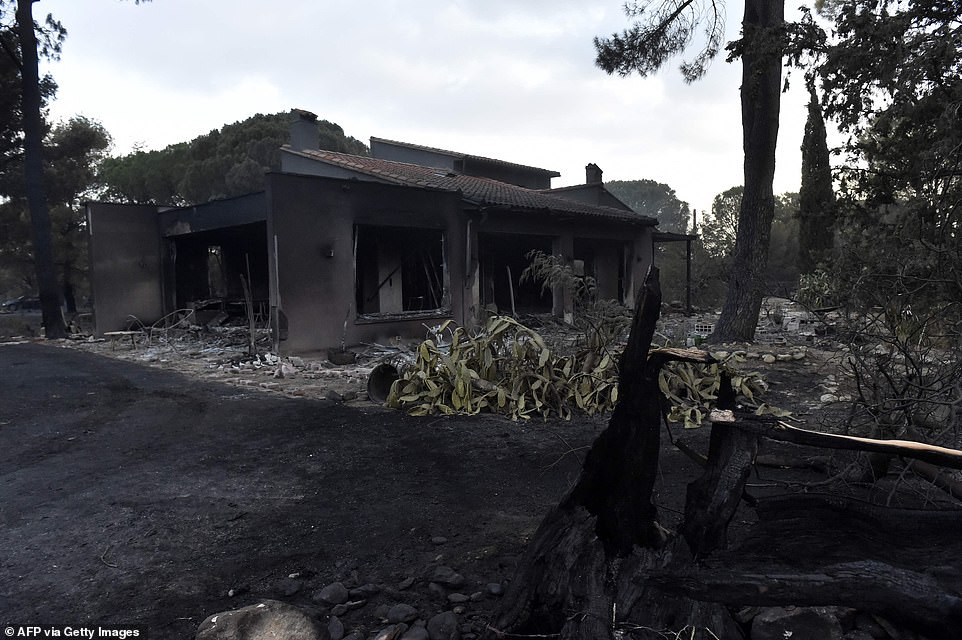
The smouldering remains of a house are seen in the aftermath of the fire that ravaged Saint Andre on Tuesday
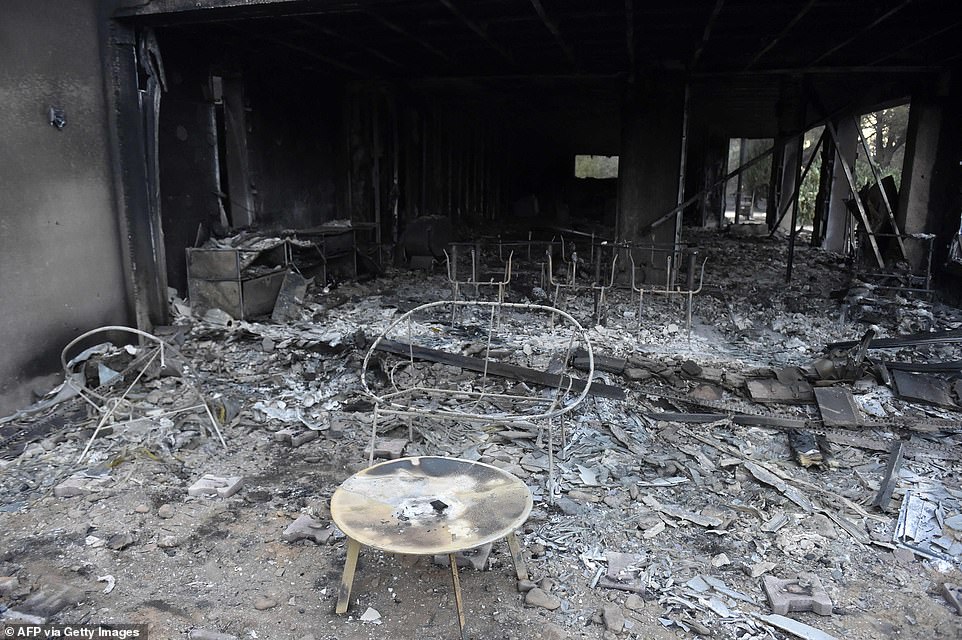
The burnt remains of furniture are seen inside a house in Saint-Andre on Tuesday
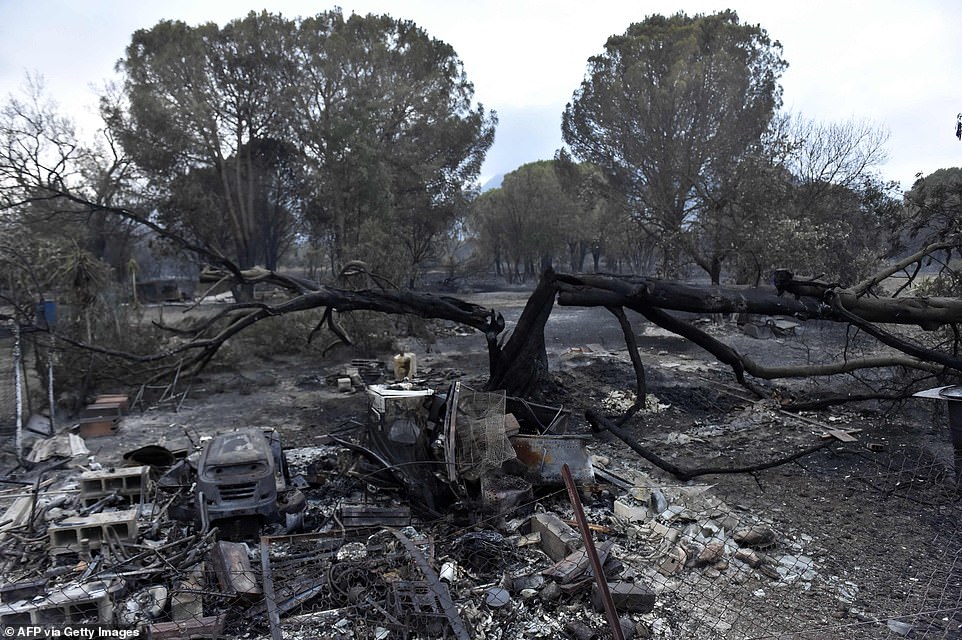
A burnt tree split in half is seen in the remains of a burnt-out house in the aftermath of the wildfire in Saint-Andre, southern France, on Tuesday
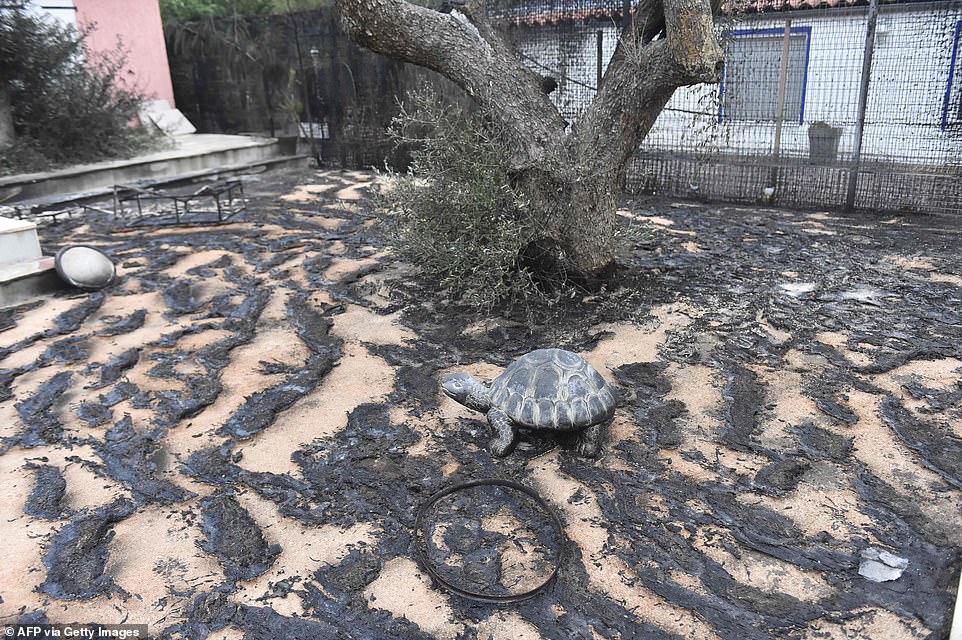
Remains of melted lawn – included a statue of a tortoise – are seen in the yard of a burnt-out house following the wildfire in Saint-Andre on Tuesday
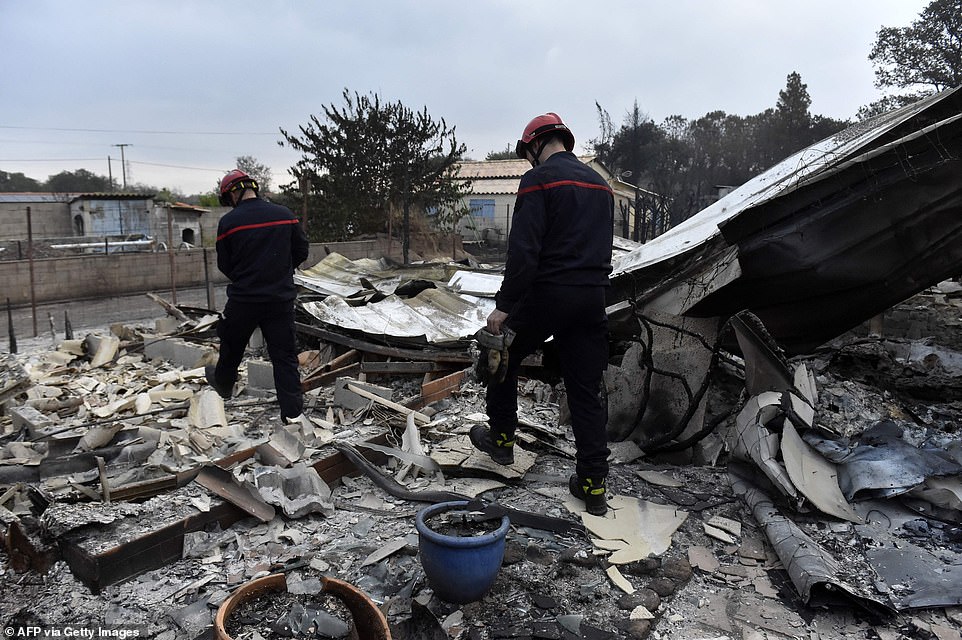
Firefighters inspect the damage and look for possible burn spots after the fire that ravaged the commune of Saint-Andre on Tuesday
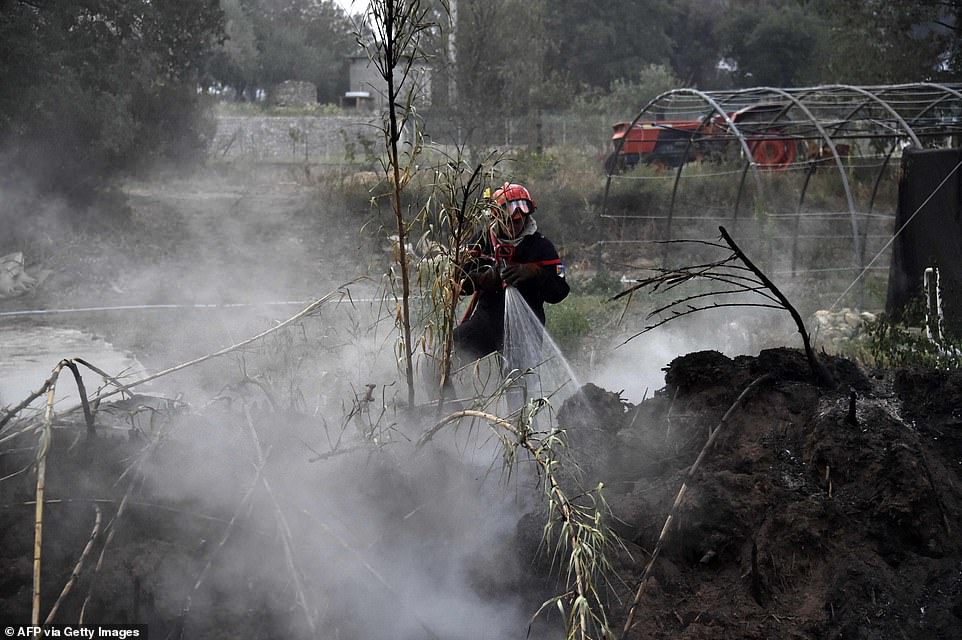
A firefighter puts out fires after the blaze tore through southern France on Tuesday
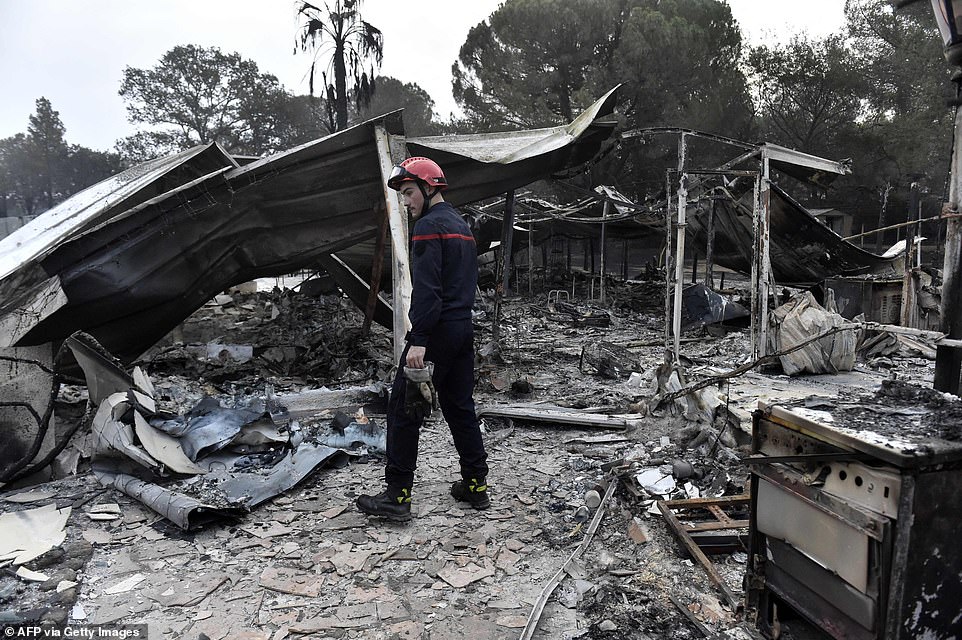
A firefighter inspects the damage and possible burn spots after the fire that ravaged the commune of Saint Andre on Tuesday
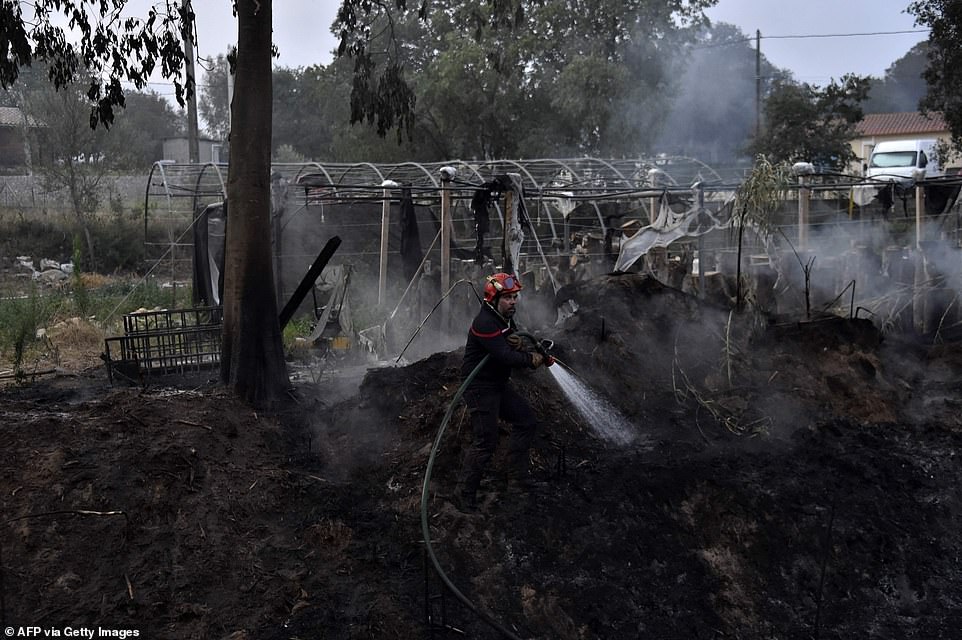
A firefighter puts out fires next to a greenhouse after the wildfires ripped through areas close to Perpignan on Tuesday
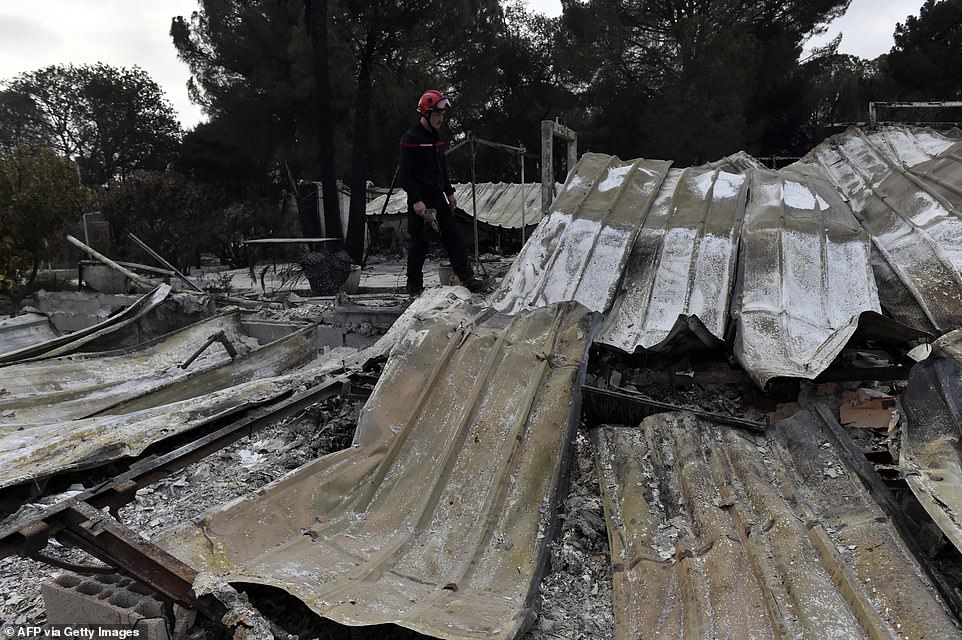
A firefighter inspects a damaged house after the wildfires ripped through areas close to Perpignan on Tuesday
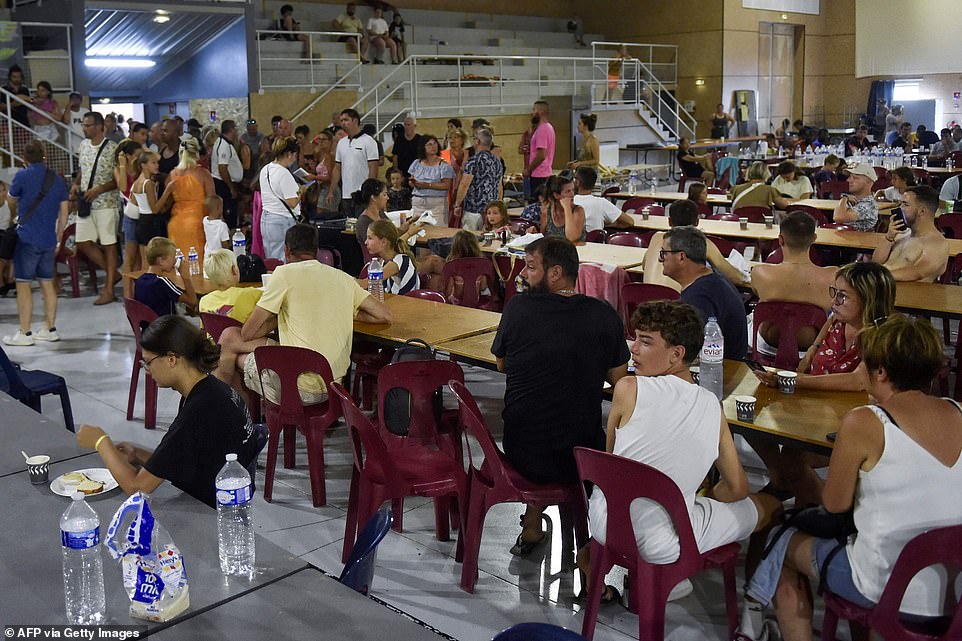
More than 3,000 tourists have now been evacuated from their holiday campsites across the region after the inferno ripped through the tourist hotspot
France is this week in the midst of its fourth heat wave of the year as the country faces what the government warned is its worst drought on record.
Temperatures in the south of the country are expected to reach up to 40 degrees Celsius (104 degrees Fahrenheit).
Wildfires have ravaged countries across southern Europe this summer, forcing thousands to be evacuated and thousands more to cancel their holidays.
Greece, Italy, Algeria and Tunisia combined lost more than 1,350 square kilometers (520 square miles) to blazes that affected 120,000 people in late July, according to European Union estimates.
Last week, a series of wildfires ripped through Portugal and neighbouring Spain as temperatures soared to over 44C, forcing the evacuation of thousands of holidaymakers from villages and campsites.
The popular holiday island of Rhodes – known for its sparkling beeches and ancient Greek sites – was also ravaged by wildfires for 11 days last month.
After thousands of people were evacuated during the height of travel season, Rhodes is weighing how the crisis will affect its vital tourism sector, which fuels most of its economy and some 20 per cent of Greece’s.
It’s the same for other Mediterranean destinations, like Italy and Spain, where the tourism sector also is being hit by heat waves and wildfires.
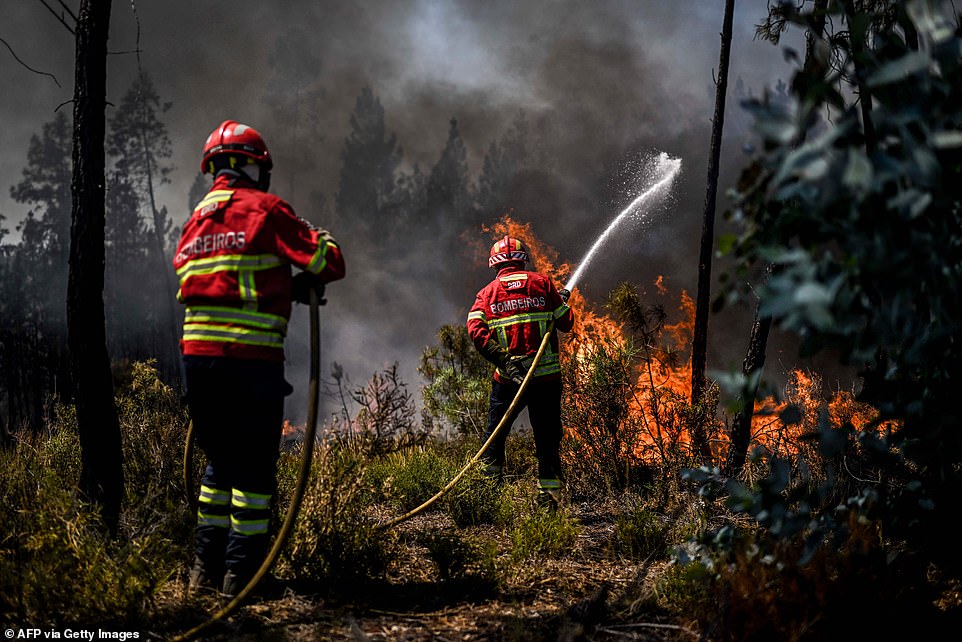
Wildfires have ravaged countries across southern Europe this summer, forcing thousands to be evacuated and thousands more to cancel their holidays. Pictured: Firefighters tackle a wildfire in Carrascal in Portugal on August 6
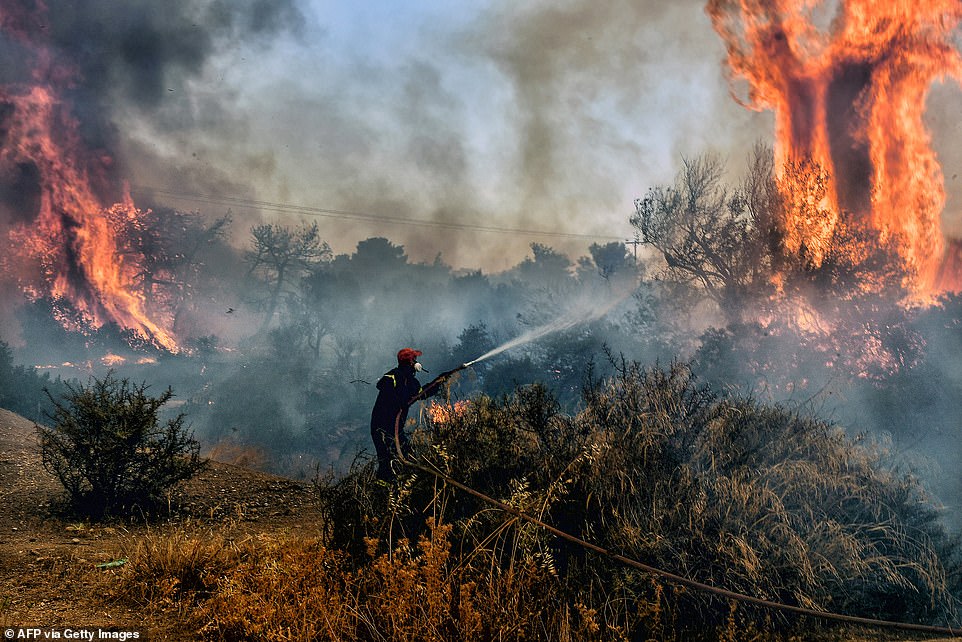
A fireman douses flames on a wildfire at Panorama settlement near Agioi Theodori, some 70 kms west of Athens on July 18
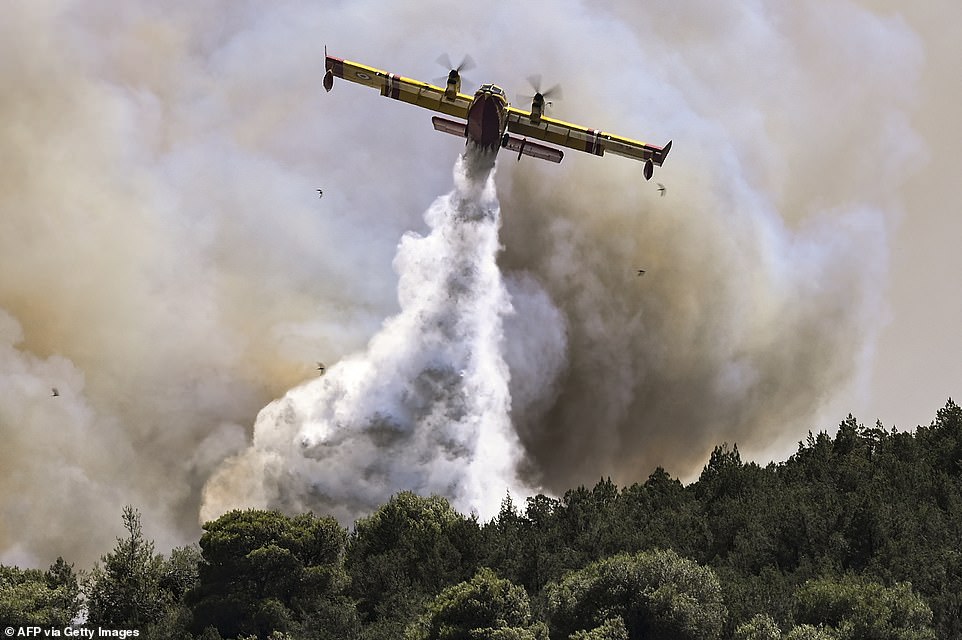
A Canadair firefighting plane sprays water during a fire in Dervenochoria, north-west of Athens, on July 19
Climate scientists say heat waves are more intense, more frequent and longer because of climate change — and coupled with droughts have made wildfires harder to fight.
They say climate change will continue to make weather more extreme and wildfires more frequent and destructive.
‘Climate change kills,’ Spanish Prime Minister Pedro Sánchez said last month during a visit to the Extremadura region, the site of three major blazes. ‘It kills people, it kills our ecosystems and biodiversity.’
Wildfires raging through Europe this summer have so far burned the second-largest area on record, even though the region is only halfway through its typical fire season, according to data from the European Union’s Joint Research Centre.
Victor Resco de Dios, professor of forest engineering at Spain’s Lleida University, said the large fires France and Portugal suffered in early July were ‘extremely unusual’ and demonstrated how climate change is causing the fire season to start earlier and last longer.
‘Today’s fires in the Mediterranean can no longer be extinguished… Large fires are getting bigger and bigger,’ he said.
Southern European countries such as Portugal and Greece experience fires most summers, but hotter temperatures are pushing severe wildfire risk north, with Germany, Slovenia and the Czech Republic among those hit this season.
In stark contrast to the wildfires seen in France, Spain, Greece, Croatia and southern Italy in recent weeks, northern Italy and Scandinavia have been hit by devastating floods and storms.
In the Italian town of Bardonecchia, near Turin in the Val di Susa valley, a ‘tsunami of mud’ crashed through the streets on Sunday, sending people fleeing for their lives.
Dramatic video shows the churning river of mud forming a huge wave as it burst its banks and slammed into a street following heavy rain in Bardonecchia.
Horrified residents and tourists were sent running for their lives as the huge ‘mud tsunami’ smashed through a gate and sent debris flying towards them on Sunday evening.
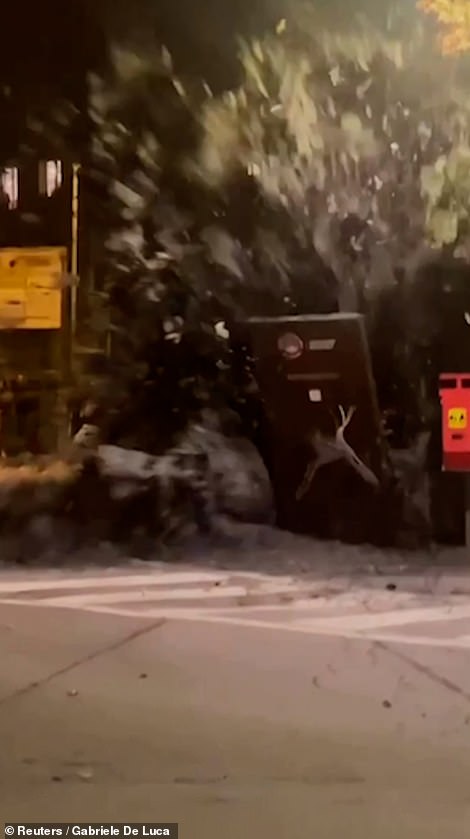
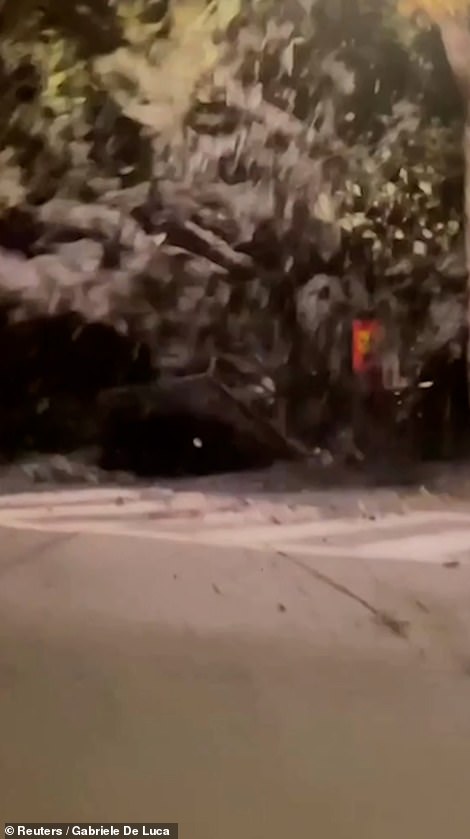
Dramatic video shows the churning river of mud forming a huge wave as it burst its banks and slammed into a street following heavy rain in the town of Bardonecchia, near Turin in the Val di Susa valley
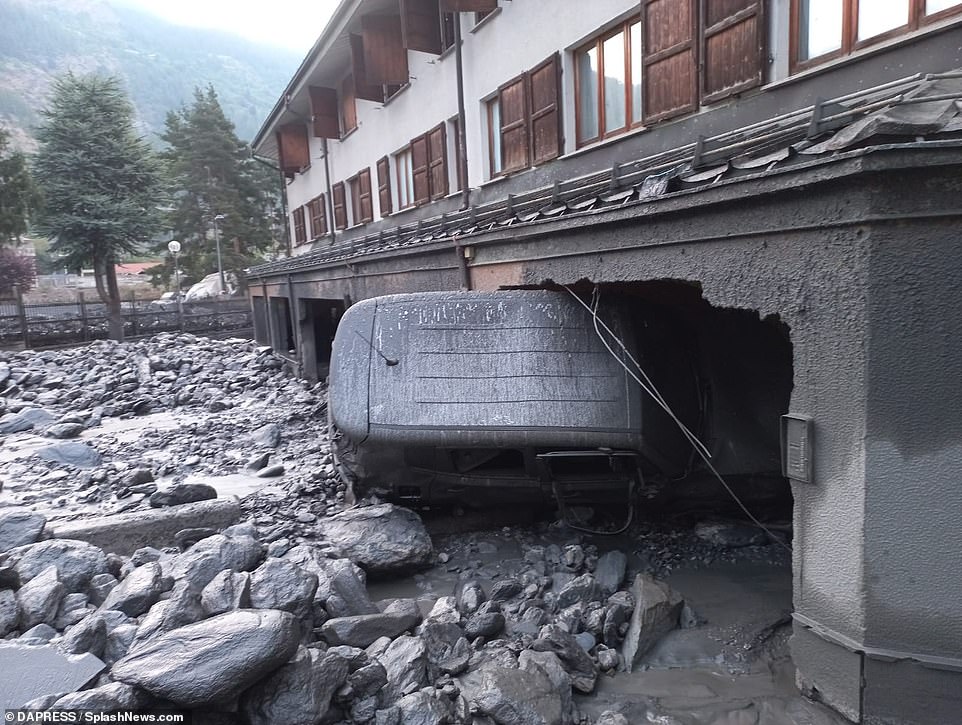
Further video shows a thick wall of mud coursing down the river banks that pass through the Alpine town, blanketing cars with debris
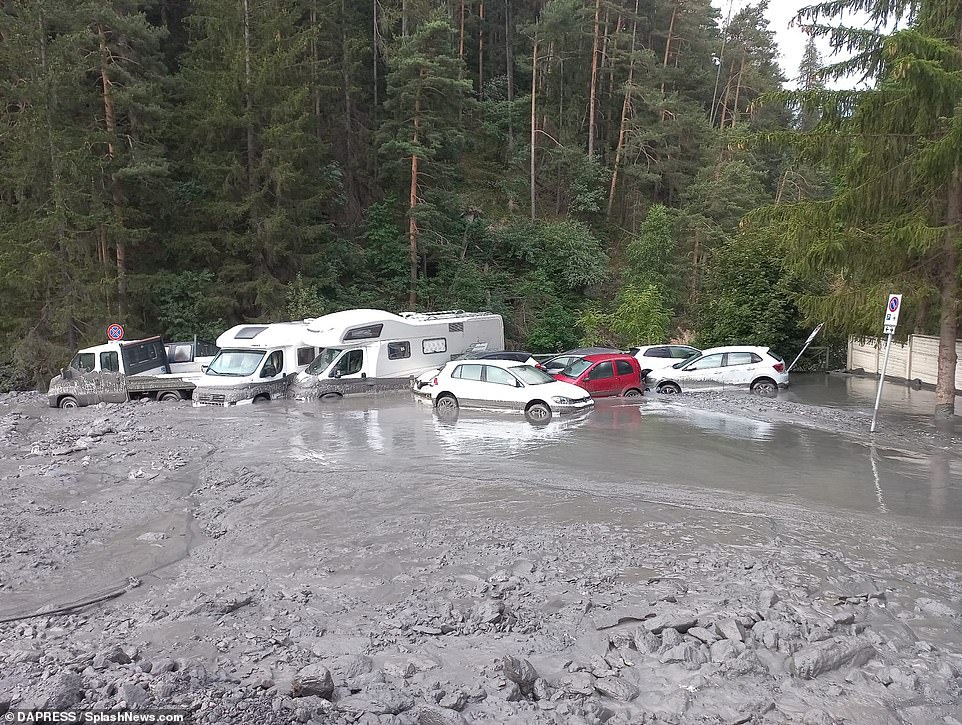
Cars and campervans were damaged in the mudslide in Bardonecchia on Sunday
Further video shows a thick wall of mud thundering down the river banks that pass through the Alpine town, blanketing cars with debris.
Rescuers desperately searched for five people believed to have been missing following the mudslide but authorities later said all residents had been accounted for and there were no victims.
Italy has been faced with a series of deadly floods and storms in recent months, with 13 people killed in May after a devastating flood tore through homes in the popular holiday region of Emilia-Romagna.
Desperate families – including young children and the elderly – were forced to clamber on to their roofs in the tourist hotspot as they waited anxiously for rescuers to reach them in helicopters.
In the city of Cesena locals were forced to swim through the submerged streets, past sunken cars and floating furniture, to reach higher ground.
Last month, severe storms also battered the north of Italy, killing two woman and a 16-year-old girl scout.
The overnight storm on July 25 saw roofs torn off and hundreds of trees uprooted in Milan. Roads were blocked and cars were smashed by the debris.
Two women were killed in the northern Monza and Brescia provinces after being crushed by falling trees, while a teenager was seriously injured when he was hit by a falling branch in the Veneto region.
In the area around nearby Brescia, a 16-year-old girl on a scout camp was killed when a tree fell on her tent, according to Italian news agencies.
Firefighters evacuated the other members of the camp, taking them to a sports hall nearby, ANSA said.
Tourist attractions also bore the brunt of the bad weather, as the Sforza Castle was shut after some tiles were brought down and rain was heavy enough to penetrate the glass-vaulted Galleria Vittorio Emanuele II, Milan’s famed shopping arcade.
Elsewhere in Europe, a 135mph tornado toppled a construction crane in Switzerland last month, killing one person, while ripping roofs off buildings. Storms also lashed France and Germany with torrential rain flooding streets in Berlin.
And last week, heavy rains triggered landslides and flooding across southern Norway and Sweden, forcing communities to evacuate.
The Norwegian dam at the Braskereidfoss hydroelectric power plant, on the Glåma, Norway’s longest and most voluminous river, burst on Wednesday after days of rain.
It caused devastating floods, with footage showing wooden cabins floating down overflowing rivers. One clip shows a mobile home crashing into a bridge on Norway’s Hemsilar river.
People were seen standing on the bridge as they watched caravans being swept away, crashing into the bridge and being crushed under the weight.
[ad_2]


